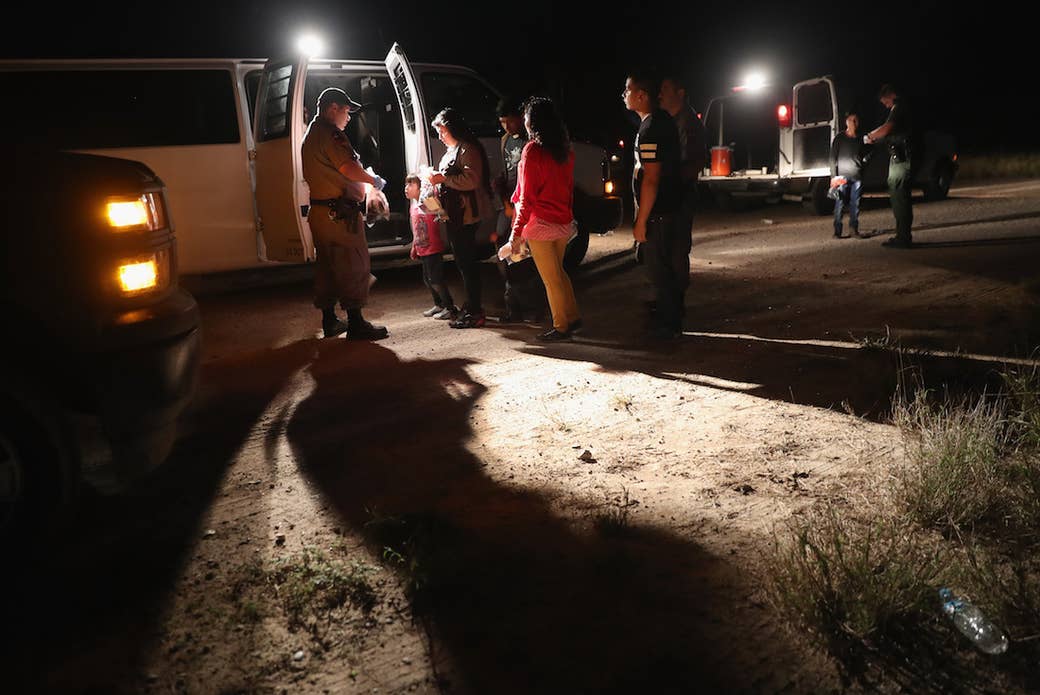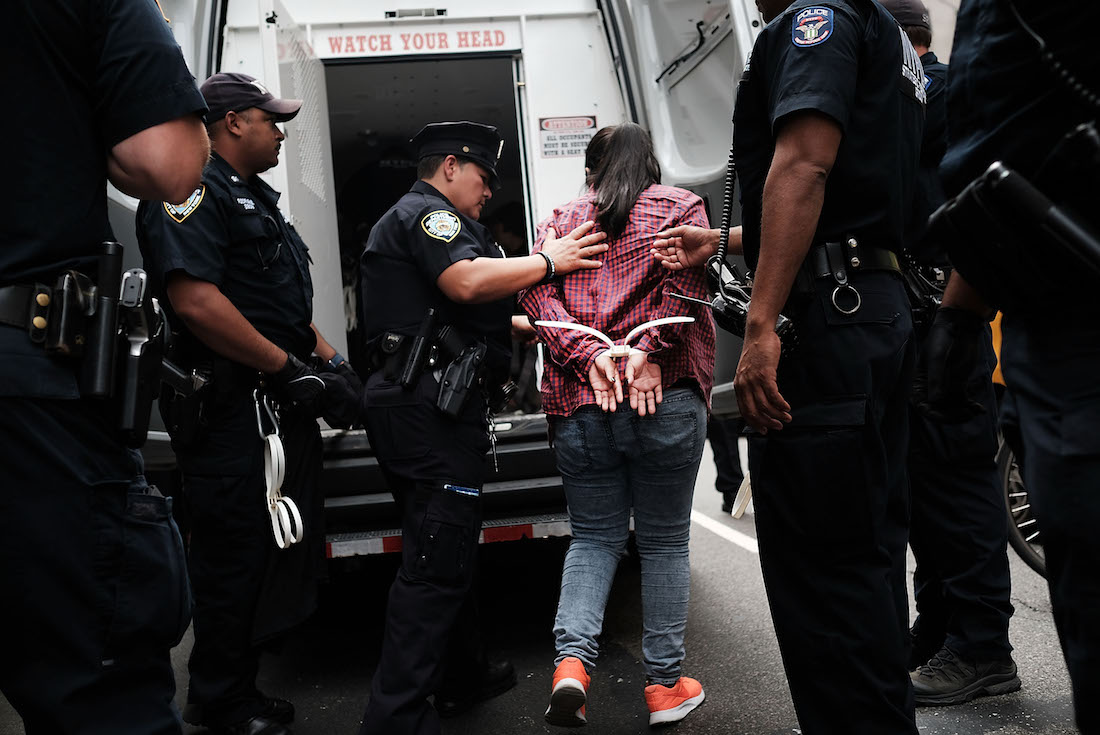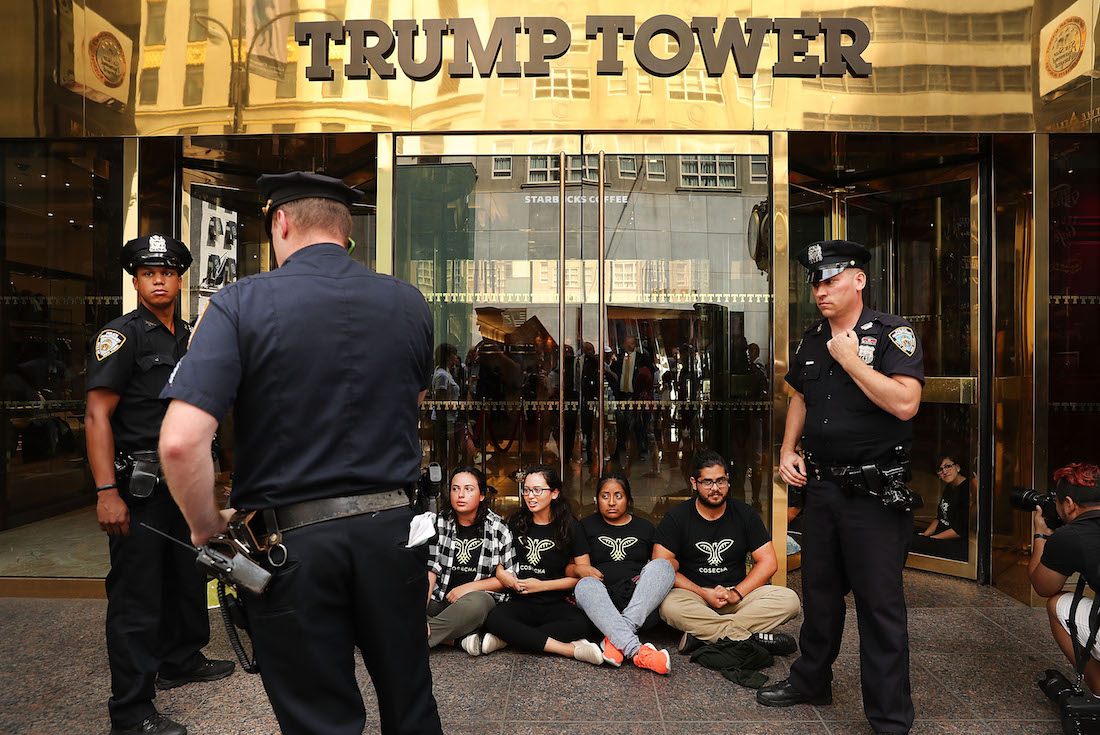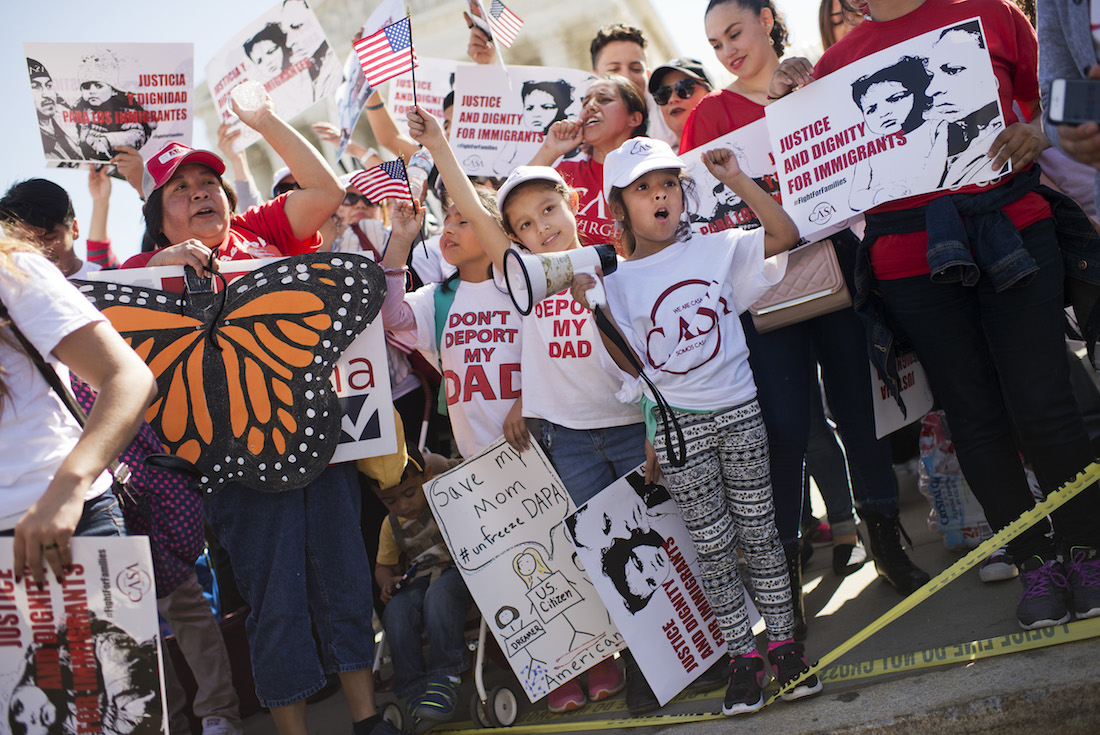
During his two terms in office, President Barack Obama has deported more people— 2 million in total—than any other president. Nevertheless, there are a half dozen states across the country who don’t think Obama, nor federal government, is doing enough to stem illegal immigration. These states have gone to extreme lengths to wage a war of attrition on their immigrant population, hoping to drive out the immigrants through laws that criminalize their everyday existence.
Take Ignacio Portillo, an undocumented resident who has lived in the U.S. for 16 years. Portillo runs a construction company in Atlanta and has been arrested three times in two years for driving without a license. He spent weeks in a jail, paid over $2,000 in fines, $4,000 for bond, and has been put on probation for the act of driving a car. The problem is that Portillo cannot get a Georgia driver’s license because the state refuses to issue them to undocumented immigrants. And thanks to a 2008 law, if a person is arrested four times for driving without a license in Georgia, they become a felon. Under current immigration law, undocumented felons are prioritized and targeted for deportation in record numbers.
“This is not accidental,” says Flavia Jimenez, a researcher for the Advancement Project, which is a non-profit civil rights organization based in Washington D.C. Jimenez has been studying how the 2008 driver’s license law in Georgia impacts the immigrant community. “It’s an intentional move to restrict the number of immigrants living in Georgia and make the quality of life for those immigrants that much poorer instead of better,” she tells Complex.
Indeed, Georgia’s driver’s license law, as well as other similar punitive laws in Arizona, Pennsylvania, and Alabama, spring from the same ideological fount: attrition through enforcement. Made popular through right wing think tanks like the Center for Immigration Studies and activist lawyer and current secretary of state for Kansas, Kris Kobach, the doctrine of attrition argues that the federal government is failing to adequately deal with the problem of immigration. Therefore, it’s up to states and local police departments to reduce the immigrant population by creating a hostile work and life environment for them. The notion is that under attrition laws, life for the immigrant will be so costly, difficult, and dangerous, they will “self-deport.” Those who do not leave on their own accord will be easier to kick out of the country due to their various violations of attrition laws.

Here’s the key graph in Kobach’s 2008 article in the Tulsa Journal for Comparative and International Law:
“The 12 to 20 million illegal aliens in the United States need not be rounded up and forcibly removed through direct government action. Illegal aliens can be encouraged to depart the United States on their own through a strategy of attrition through enforcement. Illegal aliens are rational decision makers. If the risks of detention or involuntary removal go up, and the probability of being able to obtain unauthorized employment goes down, then at some point, the rational decision is to return home.”
Several states have embraced Kobach’s strategy.
In 2011, Alabama passed a sweeping immigration law, H.B. 10, which granted police officers the right to investigate a person’s immigration status. It also requires elementary, middle, and high school teachers to flag students they believed are undocumented. The law also makes it a felony for an undocumented person to do business with any subdivision of the state. This specific section of the law actually triggered multiple counties to cut off water and power services to residents unless they showed proof that they were legal U.S. citizens.
In 2013, a federal court struck down a Pennsylvania law that made it illegal for landlords to rent homes or businesses to undocumented immigrants. Businesses that refused to comply with the laws and investigate the immigration status of employees and tenants would be fined or denied business permits. Nevertheless, in the intervening years between the passage of the law in 2006 and its nullification, a dozen other cities across the country attempted to pass similar ordinances.
Indiana, South Carolina, and Utah have indeed passed similar laws, but the most egregious is Arizona’s SB 1070—often called the “show me your papers act”—which passed in 2010 to both outrage and cheers. The law required that state police attempt to determine an individual's immigration status during a "lawful stop, detention, or arrest," when there is “reasonable suspicion” that the individual is an illegal immigrant. This provision, critics argue, is what leads to unchecked racial profiling. Because the language is vague, a “reasonable suspicion” for a police officer to investigate a person’s immigration status could simply stem from the fact that a person looks as though he or she is Latino. The Supreme Court would eventually take up this provision in 2012 and uphold much of it as constitutionally sound because the law safeguarded against suspicion based solely on race or ethnicity. Other provisions in SB 1070 were thrown out.
Another provision in the bill required immigrants over the age of 14 who had been in the U.S. for more than 30 days to carry their immigration papers with them at all times under the law. The first time a person is arrested for not having immigration papers carries a minimum fine of $500 and up to 20 days in jail. Subsequent offenses can result in a minimum $1,000 fine and a maximum jail sentence of 6 months.

SB 1070 also made it illegal to harbor, shield, or transport undocumented immigrants, which in effect, resulted in the arresting of day laborers and the people who hired them.
Under the intent portion of the bill, the authors wrote, “The legislature declares that the intent of this act is to make attrition through enforcement the public policy of all state and local government agencies in Arizona.”
The genesis of SB 1070 is a disturbing one since it involved a notorious and nativist politician, as well as the American Legislative Exchange Council (ALEC), a conservative “non-profit” organization that gathers right wing legislators and powerful corporations (e.g. Reynolds American Inc., ExxonMobil, and the National Rifle Association) to draft model bills that can easily slide into statehouses.
According to an investigation by NPR, SB 1070 was drafted in four days in a hotel room filled with Arizona state legislators, ALEC staffers, and a representative from Corrections Corporation of America, the largest for-profit prison corporation in the country. In other words, the corporation that had the most to gain by creating a massive criminal class of Arizona’s Latino population had a seat at the table.
At the center was Russell Pearce, a state senator who was infamous for his anti-immigrant stance inside the Arizona statehouse. That same year, Pearce tried to move legislation that would force schools to account for how much taxpayer money was spent on undocumented students. Pearce also sponsored a ballot initiative that would deny bail to undocumented immigrants were they to be arrested. Yet, for his most ambitious bill, Pearce did not go to the statehouse with his plans. Instead, he met with ALEC members and the Corrections Corporation of America in a Hyatt conference room. Reporter Laura Sullivan at NPR unearthed internal documents from Corrections Corporation of America, which stated that executives believed immigrant detention would be the next big market boon, and expected that a “significant portion of our revenues" would flow in from Immigration and Customs Enforcement, the agency that detains illegal immigrants.
According to NPR’s Sullivan, the group gathered inside of the Hyatt and eventually voted on model legislation that would be submitted two months later inside the Arizona statehouse, practically word-for-word.

The relationship between immigration policy and the criminal justice system is one that deserves more attention, Jimenez argues. “If we're going to be talking about ending our mass incarceration crisis, we need to also understand the implications of all of this on immigrants because state laws have created a new type of criminality,” she says. “Now, people like Ignacio Portillo are felons for just driving their car.” Indeed, states like Arizona and Georgia are using the criminal justice system and incarceration as way to impose their own version of a punitive immigration policy.
When the Obama administration filed an injunction to block the law, Pearce lashed out, "When you talk about jihad, that is exactly what Obama has against America, specifically the state of Arizona.” Pearce was later recalled and lost his state senate seat to a more moderate Republican in 2011. In 2014, he claimed on his radio show that were he in charge of Medicaid, poor and unemployed women receiving benefits would be sterilized.
Although Pearce’s bill passed, some of its more overreaching provisions were struck down, while others were only softened. Thanks to a lawsuit filed by the American Civil Liberties Union, the Organization for Day Laborers, and several other civil rights groups, the provision that made it illegal to harbor or transport an undocumented immigrant was struck down. However, the ability for police to investigate a person’s immigration status was upheld. “The decision was bittersweet,” says 65-year old Salvador Reza, a Chicano living in Arizona and a plaintiff in the lawsuit. “It was victory that we were able to get the provision that affected day laborers thrown out, but allowing police to investigate status means Arizona has legally instituted racial profiling,” Reza says. “It’s very sad.”
Reza was 10 years old when he was deported in the early 1950s. His father was part of the Bracero program, which allowed migrants temporary work that came with protections, such as adequate shelter, food and sanitation, as well as a minimum wage pay of 30 cents an hour. Reza and his family were living and going to school in Texas while his father worked, even though the family did not have sanctioned residency. When they were discovered, the family was told to have their bags packed in three days to return to Mexico. “I felt helpless,” Reza recalls. Eventually, the family was granted residency, and Reza grew up in a border town that was often monitored by border patrol. One afternoon while playing outside barefoot in an open field, he saw a patrol car turn down the highway his house was on. “I panicked, I thought they were coming for us again, and I just started running and running.” It was a false alarm, but Reza ended up running right into a thorn bush and hiding there for a time, terrified and in pain.
“Living in fear of being sent away from your home,” Reza says, “It makes you feel powerless.”
Reza now works with the Day Laborers Organization and is part of a campaign to educate immigrant community members on how to interact with police to avoid detention. His main advice, “Get a lawyer. Don’t talk to them without a warrant or a lawyer.”
In Georgia, there are grassroots efforts to help immigrants deal with the punishing new regime. Adelina Nichols, the executive director of Georgia Latino Alliance for Human Rights (GLAHR), reveals that her organization is attempting to educate the Latino community about their rights and on how to push back on police officers regarding their treatment of community members. “We are trying to build a culture of resistance,” Nichols says. After an undocumented person is arrested for a minor traffic violation or not having their driver’s license, it’s common for Immigration and Customs Enforcement (ICE) and the police to do an early morning raid. Nichols tells community members to stand firm and not allow anyone inside their house without a warrant.

In the city of Rosewell, Nicholas points out, even though Latinos only account for 13 percent of the population, they account for 63 percent of the traffic arrests. “This is because of the roadblocks,” Nichols explains. “The roadblocks are where the racial profiling happens. And if you get detained there, it costs $3,500 just to get out.”
The dragnet created by these punitive state laws to ensnare immigrants also has a disproportionate impact on the black community. In Houston County, Georgia, blacks make up 28 percent of the population, but account for 56 percent of the traffic arrests. According to GLAHR’s report, Houston County reported taking in 6 million dollars through enforcement of the felony driving law in a four-year period. Because the fines increase with every new arrest, African-American and Latino drivers are likely to pay a higher portion of the newfound revenue. It’s a reality many black families know first-hand.
Opal Tometi, activist and the co-founder of Black Lives Matters, recalls witnessing her father being profiled when she was a child growing up in Arizona. “Both of my parents are immigrants from Nigeria. We had a Mercedes because one of my dad's jobs was to sell used cars. He found this Mercedes, fixed it up, and it became our family car. But he kept getting profiled while driving this car and getting pulled over by the police,” Tometi recalls. At the time, he wasn't a U.S. citizen, and even for a while, he was undocumented, so the stakes were really high every single time. Eventually, he just got rid of the car. He literally had to sell the car because he was like, ‘This is enough.’ Scared every single time—he's petrified. He ended up getting this beat-up old white truck, which he still has, and that's what he drives to this day.”
Ever since the turmoil in Ferguson, Missouri rippled through the country in the wake of Mike Brown’s fatal shooting by police, there has been a correlation between local police leveraging fines and fees out of poor communities and increased incarceration rates. “As the cost of incarceration at the state and local level rises,” Jimenez writes in her report, “it seems a number of states and localities have relied on fees and fines to cover the increase cost of incarceration.” On the street, they call this phenomenon “paying for the cage.”
Nichols and GLAHR are organizing in cities like Rosewell, setting up meetings with police to explain the impact these roadblocks have on communities of color. “We know what we’re going to say to the cops,” Nichols says, “but they have no idea what we are going to say to them.” Nichols says their message is simple. “We will not let you criminalize our community.”


